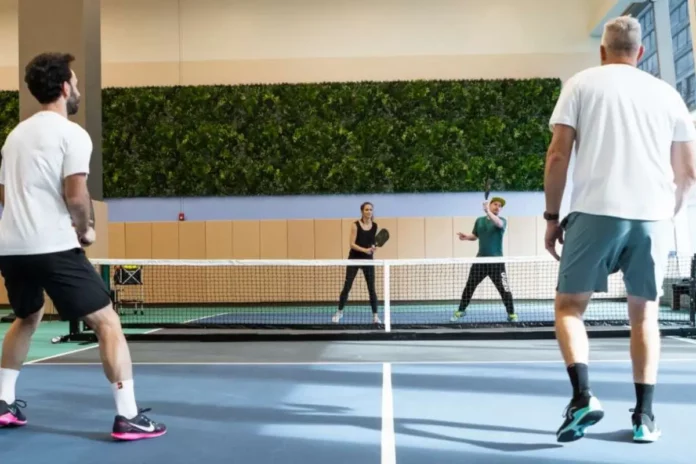Managing Pickleball Court Conflicts: With tensions rising on pickleball courts, pickleball players need better strategies to handle conflicts. Competitive games can lead to heightened emotions, and experts say preparation is key to keeping disputes under control.
Florida-based marriage and family therapist candidate Marlee Bigsby shared insights on navigating these situations.
“In a competitive environment, players being competitive by nature can often drive people to have heightened emotions. Winning and performing well is very important to these kinds of people,”
“Often in those scenarios, those people are reacting to what’s happening instead of responding to what’s happening. Whether that’s because the game isn’t going their way or maybe their partner didn’t do something they wanted them to do, there’s so many different things that could cause an outburst.”-(Marlee Bigsby)
Staying in Control
Bigsby advises players to focus on what they can control rather than reacting to their opponents.
“What’s not in my control is my opponent’s emotions and the way they react. That’s completely out of my control. In that moment, I would reassure myself that no matter what happens, I have control over my response to the game, my opponent, etcetera,” -(Marlee Bigsby)
If a player encounters an opponent with heightened emotions, remaining calm is essential. Taking deep breaths can help regulate the nervous system and prevent unnecessary reactions.
View this post on Instagram
Handling Rude Opponents
Some conflicts arise from heckling or trash talk. In such cases, Bigsby suggests acknowledging emotions without letting them dictate behavior.
“It’s always important to remain calm, of course. Often just taking a deep breath can help regulate the nervous system. Also, start to notice what emotions are going on within you. And be curious about them, but you don’t have to react to those emotions, just notice and identify them.”(Marlee Bigsby)
She also quoted Steven Covey, author of The Seven Habits of Highly Effective People: “Seek first to understand, and then to be understood.”
“That quote has always resonated with me, especially when it comes to conflict and someone who is very high-strung. If I can communicate some understanding to them, usually that will end up better for me when I’m actually able to communicate with them, and then they feel like they’re understood,”
“Try to see their perspective, even though you might not feel like it’s rational, but seek first to understand where they’re coming from and what’s going to ultimately reach a solution.”(Marlee Bigsby)
Protecting Peace on the Court
Ultimately, pickleball is a game, and sportsmanship is key. If a player encounters someone who is not respecting the game, walking away is an option.
Maintaining composure, focusing on what can be controlled, and avoiding unnecessary disputes can help ensure a positive experience on the court.
News in Brief: Managing Pickleball Court Conflicts
Conflicts on pickleball courts are increasing, and experts suggest players prepare for tense moments. Therapist Marlee Bigsby recommends staying calm, focusing on what can be controlled, and understanding opponents’ perspectives. If faced with poor sportsmanship, walking away is an option. Good communication and emotional control can help maintain peace in the game.
ALSO READ: Ace Pickleball Club’s Olathe Indoor Pickleball Courts: New Facility Opens This Summer!

